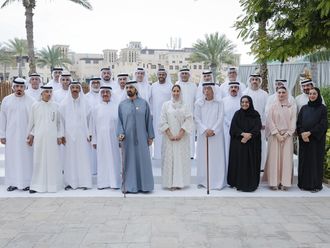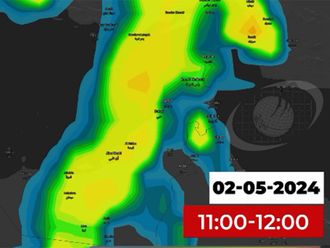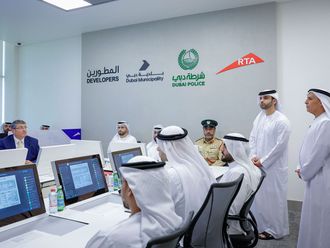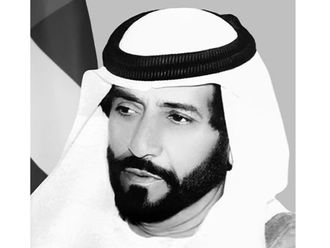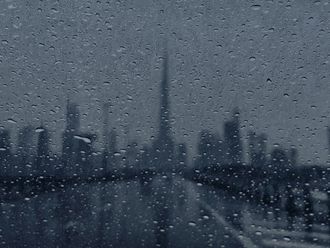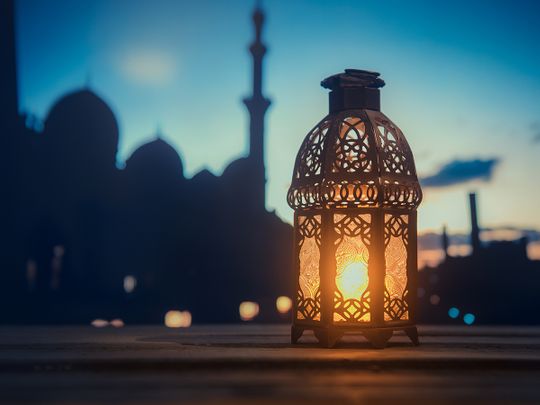
Dubai: This Ramadan is a chance to rejoice doubly.
Firstly, the holy month will bring with it fasting and reflection, charity and prayer. Secondly, the easing of COVID-19 restrictions, in line with falling cases in the UAE, means it is easier for the community to take part in volunteering activities and for families to enjoy leisure time at events.
Ramadan will also bring with it a new routine and a change of pace. Working and school hours will be shortened, allowing more time for family, prayer and relaxation.
For Muslims, the day will begin before sun up, as they rise from slumber for suhoor, the pre-dawn meal to provide energy for a day of fasting, which will be around 14 hours long in the UAE.
After work, families and friends will come together for iftar, the meal taken at the end of the day’s fast at sunset. This year, iftar tents are returning for Ramadan in the UAE, after they were put on hold because of the pandemic. These tents see mostly workers – but also people from the neighbourhood and commuters making a stop for iftar – gather inside for a free iftar meal, sponsored by charities and residents. The tents are mostly set up besides mosques – and all are welcome.
At night, mosques will hold Taraweeh prayers, which are longer prayers that worshippers are recommended to observe in Ramadan.
Needless to say, all Ramadan-themed events – religious or worldly in nature – will take place under government guidelines for COVID-19. This Ramadan will be the closet we have been to pre-pandemic times in terms of the ‘look and feel’ of the month.
However, one aspect of Ramadan has remained unchanged – the opportunity to look inwards and reclaim the drive to mend our habits and relationships.
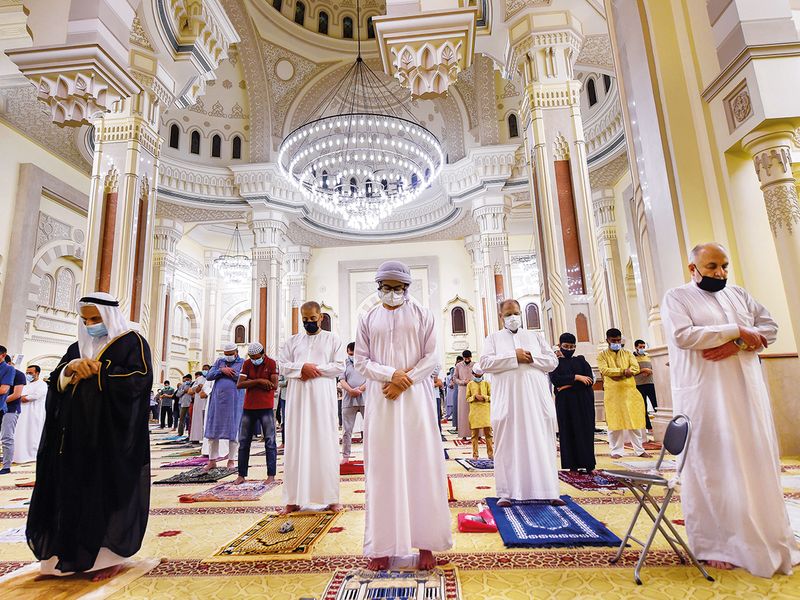
What is Ramadan?
Ramadan is the name of the ninth month of the Islamic calendar. It is an Arabic word that comes from the Arabic word ‘Al Ramad’, which means intense heat and the dryness that follows. The word reflects the hardship felt by those fasting, as well as the burning off, as it were, of sins.
Ramadan is one of the “five pillars” of Islam. Adults who are able to fast are required to avoid all food and drink from dawn to sunset for the month.
Rules of fasting
The basic rule is no food or drink of any kind from dawn to sunset.
Muslims who are sick or travelling are exempted from observing the fast. They do however have to make up the days they missed, which can be done any time before the next Ramadan begins.
Pregnant women, women who are breastfeeding or menstruating are also exempted from the fast. They must also make up for the missed days at another time.
The missed days of fasting to be made up don’t have to be consecutive; they can be separated by break days in between.
Fasting also involves abstaining from sexual intercourse during the fasting hours.
Most scholars agree smoking breaks the fast and so must be avoided during the day.
There are other things that technically don’t break the fast but “spoil” or taint it, detracting from the spiritual reward. For example, cursing, lying, backbiting or quarrelling is even more emphatically forbidden during Ramadan.
Contrary to what many people think, some things do not break the fast. Using eye-drops or perfume, applying skin lotion, or brushing the teeth are some habits that have no effect on the fast.
In fact, using the traditional toothbrush — the miswak, made from the twig of the siwak tree — is highly recommended. But care must be taken to not swallow anything while brushing the teeth.
Ramadan guidelines for non-Muslims
In the UAE, and in many other Muslim countries, eating, drinking or smoking in public, or in the car, is not recommended from dawn to sunset. There are designated areas in many workplaces for lunch, as well as authorised restaurants people who are not fasting can visit.
People can continue grocery shopping as normal. Many restaurants also continue food deliveries to homes and offices as well as pick-up orders.
Modest clothing is recommended, day and night, in public. For example, shoulders and knees should be covered.
Listening to loud music should also be avoided.
It is seen as a polite gesture to greet Muslims with the saying ‘Ramadan Kareem’ at the start of Ramadan, which means ‘Have a blessed Ramadan’.
Public displays of affection, such as kissing or hugging, should be avoided.
The boom of iftar
A long-cherished tradition of the UAE is the announcement of the time for Iftar with the boom of cannons (the shells are empty, of course).
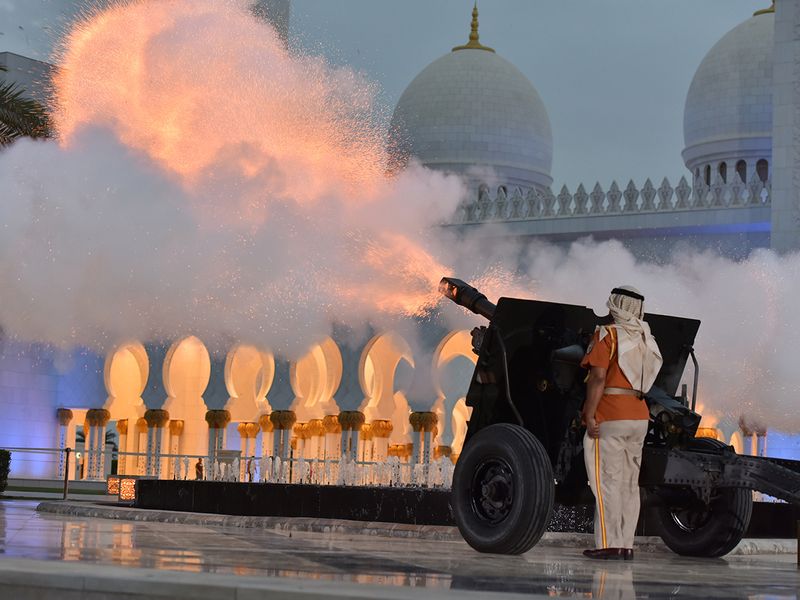
Exactly at sunset, down to the minute listed in official Ramadan timings, the canon’s firing at select locations marks the end of the day’s fast. National TV channels broadcast the occasion live every day from location.
The practice has been sustained by police departments for almost six decades. It brings back found memories for long-time residents.
■ Each cannon is fired once to announce the start of Ramadan.
■ Once every day to announce iftar.
■ Twice in a row to announce Eid Al Fitr.
■ Twice on the morning of Eid Al Fitr, after Eid prayers.
Themes of Ramadan
Sharing: Muslims are keen to share food especially during Ramadan as they believe they also earn the reward of the fasting person whom they feed at sunset.
Charity: Being empathic to the needs of others is doubly encouraged during Ramadan and the month sees an outpouring of charity, both financial and in kind.
Worship: The sanctity of Ramadan follows Muslims’ belief that the Quran was revealed in this month, in one of its last 10 days. That is why Ramadan is also known as ‘The Month of the Quran’. Muslims read and memorise the Quran more during Ramadan. The month is also marked by longer voluntary prayers at night.
Sweet tradition
■ Muslims typically end their fast by having a few dates and some water, following the practice of Prophet Mohammad (PBUH).
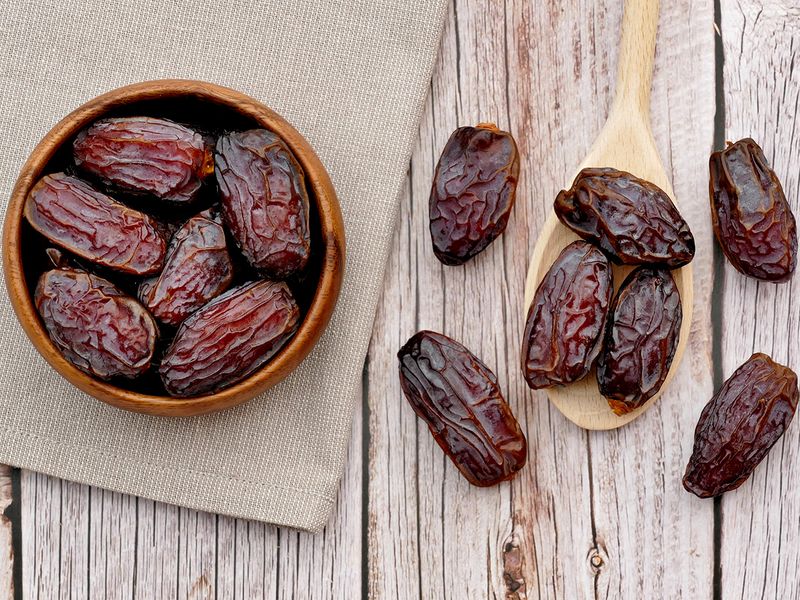
■ Dates are loaded with fast-releasing sugar that the body needs for after a long fast.
■ Dates are also preferred because they are tasty, affordable, readily available and have a long shelf-life.
■ Having dates first restores some energy to the fasted body, which prepares the digestive system to cope with the intake of a bigger meal afterwards.
■ These qualities make dates the most liked food to have at iftar, the name of the first meal taken to end the day’s fast.
The Five Pillars
Islam is based on five pillars. These are the most basic acts of worship Muslims must perform.
1 Shahada (Affirmation)
The shahada, or testimony, is the belief and declaration that there is only one God – Allah – and Prophet Mohammad (PBUH) is the messenger of Allah.
2 Salah (Praying)
The second pillar of Islam obligates five prayers a day facing the Kaaba in Makkah. The times of the prayers are called by the mua’dhen over loudspeakers at mosques, starting at dawn and ending at night.
3 Zakat (Giving of alms)
Muslims who have a certain amount of wealth, such as money or trade goods, are required to give a small percentage to the poor and needy. Zakat means a “purification” of the wealth
4 Sawm (Fasting)
Sawm means fasting and is practiced in Ramadan as an obligation. Muslims avoid food and drink from dawn until sunset.
5 Haj (Pilgrimage)
Muslims who are able go to Makkah on pilgrimage at least once in their life are required to undertake the Haj. Those who cannot afford it or cannot travel because of health reasons are excused. Pilgrims wear the same clothes - two white sheets of unstitched cloth – so all are on an equal footing.
The Qiblah
In Salah, all Muslims worldwide face the Kaaba in Makkah, Saudi Arabia. The Qiblah is the direction pointing to the Kaaba, a cube-shaped building that, according to Islamic tradition, was originally built by Prophet Ebrahim (PBUH). Muslims stand in neat rows behind the Imam, the prayer leader, all facing the Qiblah.
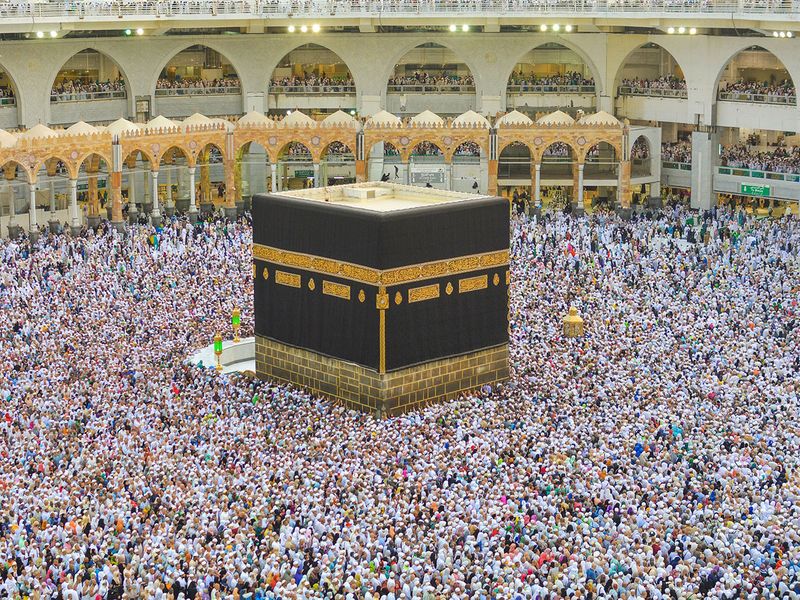
Moon-sighting
In the Islamic lunar calendar, known as the Hijri year, the first crescent sighting after the new moon marks the start of each month. Like the other Islamic months, Ramadan’s start is also tied to the crescent sighting. Moon sighting is a religious practise in Islam. Many countries, including the UAE, have a moon sighting committee that declares its findings on important occasions such as the start of Ramadan and the two festivals of Eid Al Fitr and Eid Al Adha.
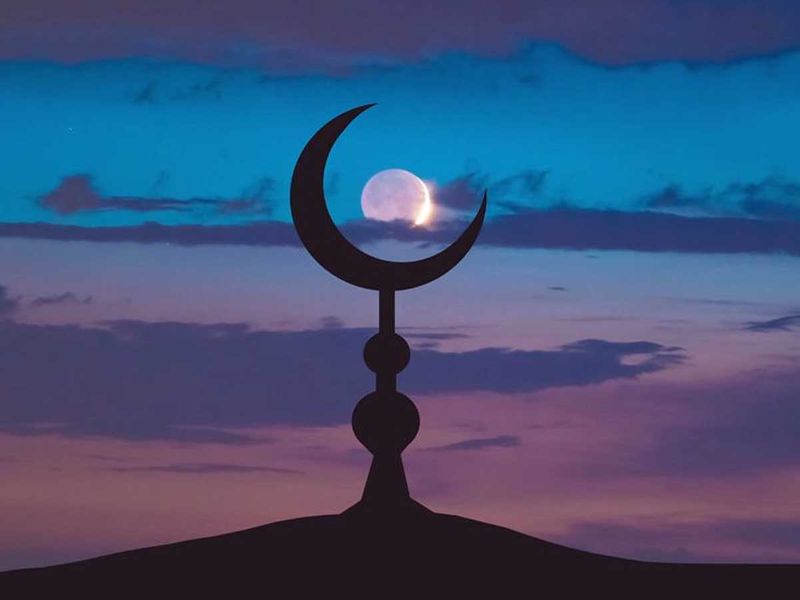
Islamic calendar
The lunar year is around 10 days shorter than the solar Gregorian year. The Islamic calendar comprises 12 months based on the lunar cycle, which is known as the Hijri (Migration) year of Mohammad (PBUH) from Makkah to Madina. The Islamic year Hijri 1 corresponds to AD622. We are currently in the Hijri year 1438.
Since the Hijri year is shorter, it arrives 10 days ‘earlier’ in relation to the Gregorian calendar, through the seasons. That’s why Ramadan comes around 10 days earlier than the previous year.
Islamic months
1 Muharram
2 Safar
3 Rabi Al Awwal
4 Rabi Al Thani
5 Jumada Al Ula
6 Jumada Al Akhira
7 Rajab
8 Sha’aban
9 Ramadan
10 Shawwal
11 Dhu Al Qa’da
12 Dhu Al Hijja



